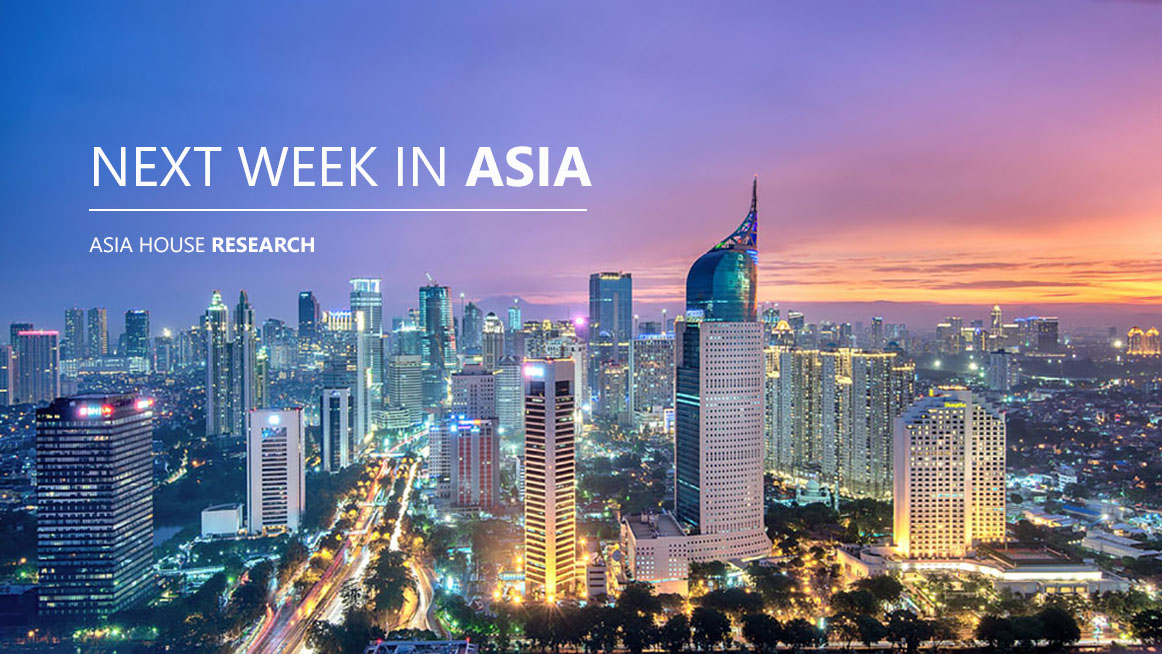Driving commercial and political engagement between Asia, the Middle East and Europe
Driving commercial and political engagement between Asia, the Middle East and Europe
Driving commercial and political engagement between Asia, the Middle East and Europe

Next Week in Asia is the Asia House weekly briefing on key trade, investment, and policy issues to watch across Asia in the week ahead, with analysis and views from our Research and Advisory team.
The Bank of Japan’s upcoming – and closely followed – Tankan index reading for large manufacturers is likely to have remained elevated in the third quarter when it is released in the coming week. Japan’s Non-manufacturing companies, however, have not been as upbeat; any overall improvement in the third quarter is unlikely, due to Japan’s domestic COVID-19 lockdown measures. At its recent meeting, the Bank of Japan kept monetary policy steady and downgraded its assessment of exports and output. The near-term outlook for the Japanese economy remains clouded by the economic impact of the crisis and is likely to remain subdued heading into the country’s upcoming elections. Japan’s parliament will elect a new prime minister on Oct. 4 at an extraordinary session, according to a Cabinet announcement. The race is reported to be between Minister Taro Kono, former Foreign Minister Fumio Kishida, former communications minister Sanae Takaichi and the LDP’s executive acting secretary general Seiko Noda. The new prime minister is expected to announce a new Cabinet on the same day.
In the week ahead, the upcoming raft of Asia’s purchasing managers’ indices (PMIs) will give a good lead indication for economic activity in the region at the start of autumn. The COVID-19 Delta variant is likely to continue to have disrupted economic activity, albeit to a lesser degree due to some easing in lockdown measures. Comparatively lower vaccination rates coupled with COVID-19 infections have led to factory shutdowns which have, in part, fueled global supply chain disruptions. There have been particularly sharp falls, to outright contractionary sub-50, readings in Vietnam, the Philippines and Malaysia. It will be worth watching these economies’ readings for further weakness, as this would suggest continued contraction in the ‘hard’ manufacturing output data in the autumn. China’s PMIs will be of particular importance: its non-manufacturing PMI has fallen below the 50-contraction mark. China’s manufacturing PMI could have followed suit and declined into contractionary territory in September. This would not augur well for China’s economic activity at the end of this year.
Asia’s retail sector has seen a significant deceleration in annual growth. The impacts of COVID-19 lockdowns and social distancing measures are likely to have been the primary factor behind the weakness. In the week ahead, Vietnam, Japan and Thailand’s upcoming retail sales reports will offer an indication of whether this trend is continuing. Cities are likely to continue to be the main source of Asia’s consumption growth, and are expected to account for more than 85 per cent of such growth over the next decade – making any future lock-down related measures a significant determinant. More broadly, however, the growing use of digital technologies may lead to resurgent strength in the retail sector, particularly through the increased use of mobile payments and social media platforms. As lockdown measures eased in a number of economies in the summer months, there is likely to be a stabilisation in retail sales growth heading into the autumn months. That said, a rise in unemployment in a number of economies suggests that this could be limited, particularly if there are further waves of infections.
As with many of Southeast Asia’s economies, Vietnam’s economic activity slowed in the summer months owing to COVID-19 lockdown measures. The contraction in activity may be abating with the easing of some lockdown measures. In the week ahead, Vietnam’s upcoming retail sales and industrial production reports are likely to continue to reflect weakness – and even outright annual contractions. Despite this, Vietnam’s upcoming foreign direct investment statistics could point to a continued acceleration. In the week ahead, its third-quarter GDP estimates are also likely to reveal a growth acceleration. Vietnam is one of Asia’s most open economies to cross-border trade, which represented 209 per cent of its GDP in 2020, according to the World Bank – second only to Singapore in the region. This openness has enabled Vietnam to show resilience during the COVID-19 pandemic. Its economy grew in 2020, one of the few to do so. Key to watch will be factory re-openings: closures and supply-chain disruptions are impacting Vietnam’s export and industrial sectors. Lockdowns in response to periodic waves of COVID-19 infections have led to factory shutdowns, which have in turn disrupted global supply chains.
After a year-long postponement due to COVID-19, Dubai’s Expo 2020 will officially begin on 1 October. Dubai’s government hopes the six-month long global fair will fuel economic recovery. The success of Expo 2020 will depend on the UAE’s ability to attract tourists and international business travellers to visit the emirate at a time when the Delta variant is leading to several countries imposing lockdowns and travel restrictions. The UAE has previously stated ambitions to attract 25 million visitors to the exhibition. The UAE’s preparations for Expo 2020 come as the country’s vaccination programme reaches new heights, with over 90 per cent of its population fully vaccinated and the UAE records the lowest number of COVID-19 cases in over a year on 22 September. Travel restrictions to the UAE have also been eased by several governments in recent weeks, including the UK, Saudi Arabia, and the Philippines, which should provide a boost to Expo 2020 visitors. Dubai’s Department of Economic Development believes Expo will spur growth, this week forecasting Dubai’s economy to expand by 3.1 per cent in 2021 and then by 3.4 per cent in 2022.
